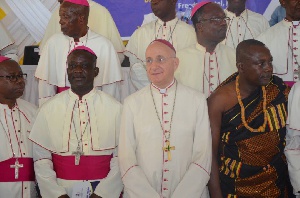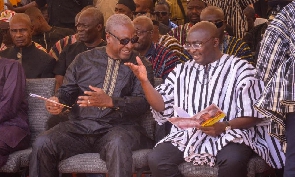The Apostolic Nuncio to Ghana, Archbishop Jean-Marie Speich has praised members of the Ghana Catholic Bishops’ Conference for meeting in the Volta Regional Capital Ho to discuss issues related to marriage and family life in the light of Amoris Laetitia.
He said the theme for this year’s Plenary Session “Integral Pastoral Care for the Family in the light of Amoris Laetitia” was apt, since as it brings to the fore a reflection of Pope Francis’ Post-Synodal Exhortation Amoris Laetitia.
“I appreciate the aptness of the theme chosen by the Ghana Catholic Bishops’ Conference for this Plenary Assembly, focusing on the integral Pastoral care of families which is indeed the goal of Pope Francis’ groundbreaking new document,” he said.
Speaking at the opening of the Assembly Monday November 13, the Apostolic Nuncio said Amoris Laetitia was to help families and everyone to experience God’s love and to know that all were welcome members of the Church.
He indicated that families in the world today were living in a complex situation with its problems and challenges coming from within and from external causes, saying that Pope Francis “invites us to look at the reality of the family today in all its complexity, with both in its lights and shadows; in faithfulness to Christ’s teaching.”
Opening Assembly, Most Rev. Philip Naameh, President of the Ghana Catholic Bishops’ Conference (GCBC), observed that a general trend that seemed to be affecting some youth across the social divide was their fixation on sexuality functionality particularly among the young and the middle aged.
“There is also a general increase in the use of orthodox medicine and its attendant Assisted Reproductive Technologies in redressing fertility challenges among urban elite families,” he added, saying that the Church is called upon to consider the moral dilemmas that Catholic Couples face when they stand before the decision to accept or reject the use of such possibilities.
The President of GCBC noted that some couples call on their Priests for direction in view of their faith and such calls, he stressed were loud cry for pastoral care and support that bothers on conscience and other fundamental moral theological questions.
He stated that the Ghanaian Church needs intervention that deal with inimical traditions of widowhood, which persist in some places, noting that “Widowhood rites of these kind are sometimes only the evident clue of worse conditions that women must suffer in the event of death of a partner or divorce.
On traditional marriage, the Archbishop said the issue of bride price, which was frequently taken out of its original traditional context, was becoming increasingly monetarised and exaggerated.
“The expense of marrying properly according to traditional rules has become, in some cases, quite burdensome for the average young man in Ghana seeking hand of a woman in marriage,” he stated.
He expressed worry that the Ghanaian family was experiencing emerging trends which were at variance with the ideal family image foreseen by the Church’s tradition of faith and morals.
He said “The phenomenon of teenage and single parenthood, poor or irresponsible parenting, separate household and distant marriages that make couples live apart, and in some cases far away from each other, and relatives ease decisions regarding separation and /or divorce are all aspects of contemporary trends in the Ghanaian family today.”
Archbishop Naameh noted other important concerns of integral pastoral care for marriage and family life in Ghana include psycho-spiritual resources for responsible parenting, moral education of children and holistic programme that makes pastoral counselling resources and support systems available across the marital journey.
He said that children were influenced by experiences of the day and the signs of their time, stating that they were born into an electronic environment with all that its virtual realities promise.
He noted that peer pressure especially for young people in towns and cities, was both physical and digital, lamenting that social media rule their lives and they must organise their experiences according to their dictates.
He said one of the most change –resistant aspect of the traditional vision of marriage and family life in Ghana was the importance society attached to fertility, sexual satisfaction and child birth in marriage.
He proposed that special attention need to be given to forming special agents to accompany the youth at their various stages of development, to assist their understanding of the Vocation of marriage and family life and the Religious Life and to prepare adequately for it.
He said all Associations in parishes need to have at least two marriage counsellors, who working closely with the Priests, could identify families in need of care.
Quoting Amoris Laetitia (The Joy of Love), Pope’s Francis’ Post-Synodal Exhortation, the GCBC President in considering a pastoral approach towards people who had contracted civil marriages, divorced and remarried or simply living together, the Church has the responsibility of helping them understand the divine pedagogy of grace in their lives and offering them assistance so they could reach the fullness of God’s plan for them.
Religion of Thursday, 16 November 2017
Source: Damian Avevor















